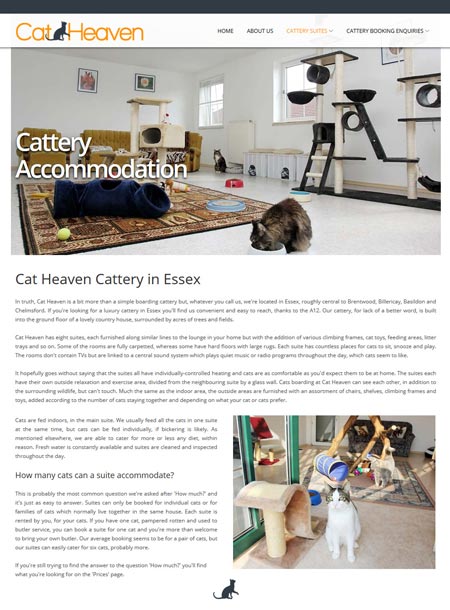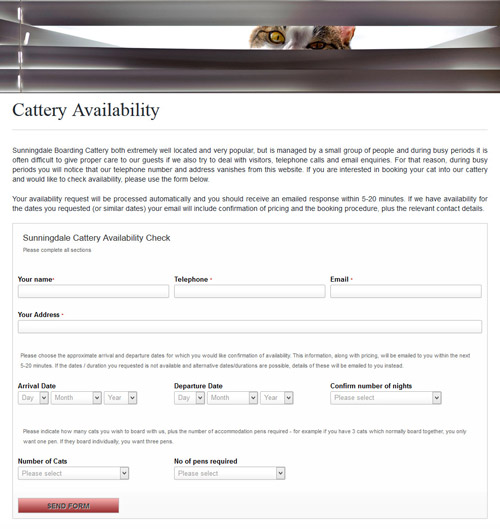Website Page Content
Writing content for your website

When we talk about writing content for your website, we are talking about the text content of your website pages. The text content is what will decide how successful your website is and how it is treated by search engines such as Google. Ideally, you should aim for at least 500 words per page, but there is no fixed upper limit. The real limit is set by your site visitors - how long are they prepared to spend reading whatever you have to say?
Don't let writing your page contents worry you. You don't need to be a professional copy writer, nor do you need to write reams of text. We will edit and optimise your text (if you ask us to) in order to achieve the best results.
Where to start?
When people ask how to plan a website we often tell them to imagine they were designing a new house. However, when it comes to planning the website page content, it's probably better to have your favourite shop or supermarket in mind.
If you stand outside a shop, the shop windows tell what you can expect to find inside, and persuades you to enter. The home page of your website needs to do the same thing. It needs to be attractive but it also needs to tell people what the website contains and where they will find it. The average visitor to a website takes only a few seconds to decide if they like your website, and if it contains what they are looking for. They read the headlines, maybe skim-read the text and then either look for what they want on the navigation menu, or close the page and look somewhere else.
Don't forget Google
Human visitors to a website rarely read everything that is written on a page, but Google always does. Google doesn't care if your website is ugly or beautiful. Google is interested in website content, how fast or slow your website is and whether it is accessible to both mobile and pc visitors. Their search robots read your pages, and decide what your site is about and what information it contains. Then, when people perform searches, Google knows which sites contain the right information.
We encourage clients to write at least 500 words of content for their website home page, more if possible. The most important content and key words should be placed near the top of each page, where visitors will find them easily, and used frequently.
Inside the front door..
You don't want to waste hours trying to find things in a supermarket. If you don't know where the sugar is, you look at the signs and follow them. Everything is in a more or less logical place, and well signposted. Your website contents should be written with this concept in mind. Everything visible and in a logical place.
Other Page Contents
Most websites have an 'about us' page, which is generally used to talk about the business or website in general. It might include details of the company background, staff experience and qualifications, and things like that. As a simple guide, ask yourself what a visitor to your website would like to know about you or your business, then answer the question.
Look at an example..

The best way to illustrate the above is to give an example. We create a lot of websites for kennels and catteries, so we'll use one of them as an example. Let's assume that you have a boarding kennels and cattery on the outskirts of Bristol. Your business was established a few years ago, but now you've decided to get a website to help maintain or increase bookings. You want to increase your general profile and to persuade people to visit your facilities, but you are also open to receiving online availability or booking requests.
In addition to a home page and an 'about us' page, you would probably have a 'kennels' page, dedicated to your kennel facilities, with photos of the kennels or maybe previous guests. So, what do people who are looking for a boarding kennels want to know? They'd probably want to know what the accommodation is like, how big it is, if it is heated or has air conditioning, what facilities are provided, when and how often dogs are exercised, and so on. So, explain all this on your kennels page. Visitors might also want to know if pets are insured, what kind of food is provided and maybe if you have kennels big enough for more than one dog sharing.
When somebody in Bristol looks on Google for a local kennels, they'll probably type something like 'kennels in Bristol' or 'Bristol boarding kennels'. They might also use different town names, if they live outside Bristol itself, so if you're within easy reach of other towns and want to attract pet owners in those areas, be sure to add this to your descriptions.
To help Google classify each page on your website correctly, use your kennels page to describe your kennels, not other things. Having described your kennels, now do the same for your cattery, remembering to use the same principals - answer the questions your visitors will want to ask. Remember to use photos to support your text - if you have a cattery unit in a nice flower garden, add several good quality photos of this, and photos of the actual accommodation.
Don't waffle. By all means tell people that their dogs will be looked after by people who love animals, but don't make the mistake of filling pages with this sort of non-descriptive content. Unless other kennels in your area are run by people who hate animals, it's utterly meaningless and normal people don't search Google for "kennels run by people who love dogs".
Other Pages

Having described your cattery and kennels, you might want to pages to provide additional information or details of others services, such as grooming, or your terms and conditions. You need people to visit your facilities, so you should have a 'how to find us' page with a map and some written instructions if you're not easy to find. You might want to have a prices page so, if you have one, think about what you want to include.
To enable site visitors to send booking enquiries, you'll need a reservations form or something similar, and maybe a general enquiries form. Booking or reservation forms generally request more information than simple enquiries forms and have a variety of fields for things such as name, address, phone numbers, age, sex and numbers of pets, booking dates and so on. All you need to do is tell us what information you want the form to collect. General enquiry forms usually include fields for a name, email address, phone number and the actual message, but that's up to you.
Some clients are wary of contact forms, thinking they will receive reams of spam emails. You don't need to worry. Firstly, the email address that these forms use are invisible. You can show a written email address if you want to, but it's not necessary. Secondly, our forms feature security measures which usually stop automatically generated spam. The only way your email account will start filling with spam is if a spammer visits your site in person and manually writes the email, which very, very few ever do.
